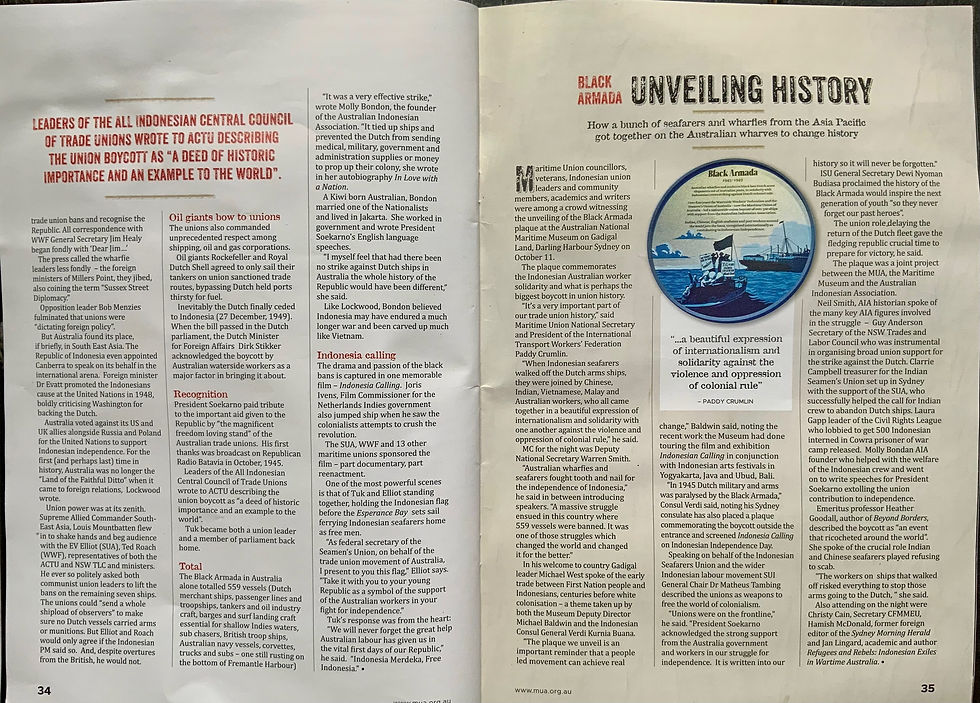Lessons from History: Batavia to Gaza
- Apr 5, 2024
- 3 min read


Australia once boasted a foreign policy independent of the United States or the United Kingdom. Should we give it another go?
It was not a blip in history, but ran over four years under the Chifley/Evatt Labor Government (1945-1949).
It was the heady of days of nationalist struggles in Asia. India, Indonesia and Vietnam were among the many former western colonies fighting for independence.
While Britain bombed Surabaya and helped the Dutch colonialists attempt to crush the revolution with US backing, Australia supported the nationalists. President Soekarno even appointed Australia to speak for Indonesia at the United Nations. We voted in favour of Indonesian independence alongside the Soviet Union and Poland, against our Western Allies.
All this had its roots in labour movement bans against Dutch arms shipments from Australian ports in 1945. It was called the Black Armada. Books have been written about it, foremost, one by the Rupert Lockwood of the same name. You can still buy a copy. There is also a film in the National Archives and on YouTube - Indonesia Calling.
Last year (and the year before that…) I worked with the Maritime Union of Australia, the Australian Indonesian Association and the National Maritime Museum to have a plaque commemorating the Black Armada placed on the Museum wall in Sydney. I wrote a couple of features for the union after its unveiling last October (above).
Is it now time for a plaque commemorating an independent foreign policy and recognition of our place in South East Asia?
Essential Media recently released a poll showing Australians are more likely to believe we should be a middle power in the Asia Pacific, rather than an all-the-way-with-the-USA ally. Only a minority support the Israeli bombardment of Gaza.
The reputation of the United States is so damaged by its unstinting support for Israeli acts of genocide in Gaza, that the majority of nations in our region would (reluctantly) choose China over the US if they had to. This is according to a recent Singapore study.
The world is starkly divided between the Global South and the old Western colonial powers.
Sure we have shown some independence from the US from time to time since Indonesian independence – we withdrew troops from Vietnam in 1972, stuck with the Paris Climate Talks (when President Trump withdrew the US), gave bipartisan support for the end of apartheid in South Africa (while Washington still clung to the white suprematists in Pretoria) and refused to recognise Jerusalem as Israel’s capital – to name a few. We were inspired by PM Keating’s vision of Australia as part of the Asia Pacific at the end of last century. But unlike our leading world role during the Indonesian independence struggle we have more often stuck tight with our Western allies and our colonial roots.
Until now. Maybe.
As the Palestinian death toll and Israeli war crimes mount in Gaza (far exceeding any by Hamas), Australia has finally broken with the US and voiced our support alongside Canada and New Zealand, for upholding international law and the United Nations demand for an immediate ceasefire.
The Israeli killing of an Australian aid worker Zomi Frankcom and her colleagues in Gaza this week (celebrated on Telegram by many Israelis with bottles of champaign and laughing emojis, according to Zirafmedia) may well hasten Australia distancing itself from the genocide. But we are still doing nothing. Yet. Just words.
In the meantime once again unions alongside community groups are acting. They have been blockading Israeli Zim Lines ships in Australian ports, while within the Labor Party the call for a ceasefire, recognition of Palestine and sanctions against Israeli war crimes grows.





























Comments